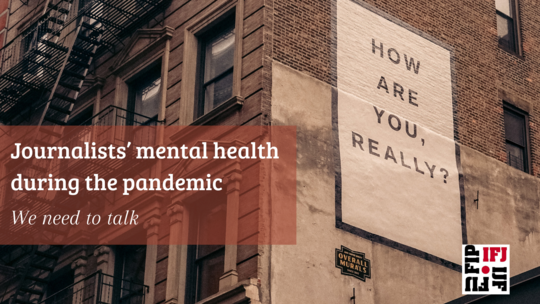In a survey published recently by the ICMF, 70% of respondents rated the psychological and emotional impact of dealing with the COVID-19 crisis as the most difficult aspect to bear in the midst of their work. In parallel, Reuters study showed that a significant number of journalists reporting on COVID-19 show signs of anxiety and depression, while an IFJ survey revealed that over ¾ of women saw their level of stress increase during the pandemic, half of them pointing at multiple tasking as the main cause.
These figures highlight an urgent need for governments, media employers and journalists’ unions to offer mental health support to help alleviate burnout among journalists covering the pandemic or suffering the socioeconomic consequences of it. If journalists are not mentally and physically well, they cannot do good journalism.
It rains in the wet
First of all it’s important to admit that mental health issues are not new in the media industry. Before the Covid-19 hit our lives, journalists were already struggling with a “perfect storm” of factors that challenged their mental health.
From job insecurity to the economic crisis of the media, from higher polarization of media to growing attacks from elected officials against journalists, from a relentless breaking news cycle to journalists’ hyperconnectivity, media workers were already highly exposed to mental health problems.
On top of this, there’s still a taboo over mental health conditions in many parts of the world and a fear of media workers losing their job or putting at risk their career if they admit mental health problems.
“Traditionally journalists are very resilient, but that does not mean they are completely untouchable. I think it's very important to recognize that because largely our industry is one where an admission of vulnerability is a problem and people have been traditionally unable to come forward and admit that vulnerability”, says Hannah Storm, journalist and mental health advocate.
The Covid-19 pandemic has brought some new elements and challenges to journalists. First, the work balance has become totally unbalanced, with some journalists overworking and many others losing their jobs or assignments, worsening the economic crisis and job insecurity among journalists. In addition to this, the line between professional and personal lives has been totally blurred.
However, and as strange as it may seem, the Covid-19 pandemic has brought also some positive elements as it has increased the number of journalists talking about mental health and stepping forward to share their experience with others and ask for help.
“I don't think I've seen in 20 years working in journalism such a degree of interest in mental health conversation. It's really important that people are starting to have this conversation. Because more people is struggling with stress and anxiety, and because media management recognises that there's more of understanding that we need to address this issue”, Hannah Storm adds.
New projects like The Self Investigation or Take A News Break are key initiatives that promote good practices and open safe spaces for journalists to share their experiences. But we need more.
How unions and employers can help
First, editors and union representatives can work to create a culture of openness and empathy when it comes to mental health. Breaking the taboo and allowing colleagues to show vulnerability is the first and most essential step towards journalists’ mental wellbeing. Talk, ask how your colleagues how they really are and be sure they are not feeling isolated. In other words: be a good colleague, keep an eye on the mood of your colleagues and be aware that it is sometimes difficult for some people to ask for help.
Second, unions must include journalists’ mental wellbeing in their agendas and understand that a mental struggling journalist cannot perform well at work. In the worst scenario, journalists are leaving the profession due to unbearable burnout, stress and anxiety. With fewer journalists, media plurality and journalism quality perishes. We can’t afford this.
Unions can also survey their members’ about their mental health to assess the extend of the problem.
Third, managers and unions should develop help support programs and make them visible and accessible for everybody, and in case there are not, communicate what phone numbers journalists can call for support. Unions can also launch trainings for managers and journalists with experts so they can better identify and understand the signs of common mental health conditions.
“Unions and managers should clearly inform media workers so they know what support policies are in place. It’s very important to put things on offer, which could be a webinar, a conversation series or tip sheets and making those available to people in an accessible way that does not undermine those who need it”, Hannah comments.
Fourth, union representatives can work on collective agreements that protect journalists’ right to disconnect and push their governments to approve remote work regulations following the IFJ guidelines on the matter that guarantee a fundamental right towards mental wellbeing. Journalists must understand their role as a journalist but you, as a human being are more important than being a journalist and you have the right to rest and to have a social life.
Useful resources:
- The Journalists’ Charity
- The Reuters Mental Health and Resilience Resource
- Headlines
- A Guide for Editors and News Managers on Working with Freelancers Exposed to Trauma.
- NUJ’s Guidelines for a health remote work
- ANP: Cómo algunas redacciones de Latinoamérica cuidan la salud mental de sus periodistas
- From resilience to resistance-organising and campaigning for better mental health and wellbeing at work –
- Mental health and the workplace: A TUC Education workbook

